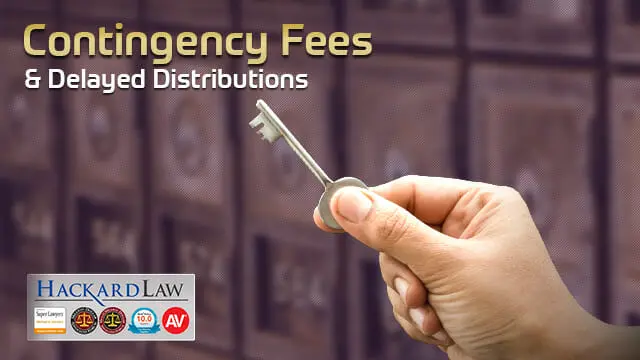
Trust Beneficiary Delayed Distributions | Contingency Fees
Whether it’s nonchalance, contempt, self-interest or ignorance, delayed trust beneficiary distributions can be truly distressing. Timely trust distributions are welcome, but unfortunately trustees don’t always act in the best interests of beneficiaries.
Trust and estate litigation law firms, like Hackard Law, are often asked to step in – to enforce trust beneficiary rights against non-performing trustees. The situation is common – the excuses the same. Stories span the spectrum of trustee inaction.
One example is worth mentioning. Circumstances are changed to protect confidentiality.
A decedent’s son thinks that he is a trust beneficiary. His father died two years ago. His brother is the beneficiary of the trust. His brother won’t take his calls. He calls us. We look up his father’s real estate and see that his father’s home was owned by his father’s trust.
The title may still be in his father’s name as trustee or his brother as a successor trustee may have filed an “Affidavit – Death of Trustee” with an attached Certificate of Death certifying that the brother is now the trustee of his father’s trust. The new trustee or successor trustee “should sign an Acceptance of Trusteeship confirming that he or she has accepted his or her nomination by the settlor to act as the successor trustee.”
The trustee has 150 days from the settlor’s death to give written notice to the Assessor’s Office of the county where the trust property is located. We prepare a demand letter to the brother asking for a copy of the trust.
In California, if the trust becomes irrevocable when the settlor dies, the trustee has 60 days after becoming trustee or 60 days after the settlor’s death, whichever happens later, to give written notice to all beneficiaries of the trust and to each heir of the decedent. Of course, the successor trustee in this case has violated these mandates.
We finally get a copy of the trust. There it is in clear language. Our client is an equal beneficiary to his brother in the right to trust assets. His brother didn’t forget. His brother was trying to get away with something. It won’t work.
Still, there are issues. How does our client engage us, or any capable law firm, to proceed against his brother, the successor trustee? Few doubt that litigation is costly. This particular case has many elements. And trust and estate litigation can be particularly expensive.
Clients have options. They can pay by the hour. They can enter into a contingency fee agreement with their lawyers. The client can weigh the possibility of minimizing costs and risks against sharing a recovery. The law firm has a similar choice. Both the client and the attorney share the risks.
A California contingency fee in trust, estate, probate and elder financial abuse litigation is the fee charged for the attorney litigator’s services against the amount recovered as a result of their services. These arrangements apply to any award, verdict, judgment, settlement or compromise. Contingency fees under California law are negotiable. California Business and Professions Code Section 6147 clearly states that such fees are not set by law but are negotiable between the attorney and client. This must be disclosed in writing to the client.
That said, an attorney doesn’t have to take a prospective client’s case any more than a prospective client must accept the attorney’s terms. Each is free to walk away from a negotiation that doesn’t meet their respective requirements. The contingent fee is usually calculated as a percentage of the client’s recovery. The percentage in trust, estate and elder financial abuse litigation usually ranges from 35% to 40%.
Hackard Law takes substantial cases where we think that we can make a significant difference and there is a wrongdoer who can be made financially accountable for their wrongdoing or breach of duty. We focus our geographic practice in California’s major urban areas – including Los Angeles, Orange, Santa Clara, San Mateo, Alameda, Contra Costa and Sacramento Counties.
If your trustee is not distributing trust assets and you would like to speak with us about your situation, call us at Hackard Law 916 313-3030. We want to hear your story.

 (916) 775-8542
(916) 775-8542